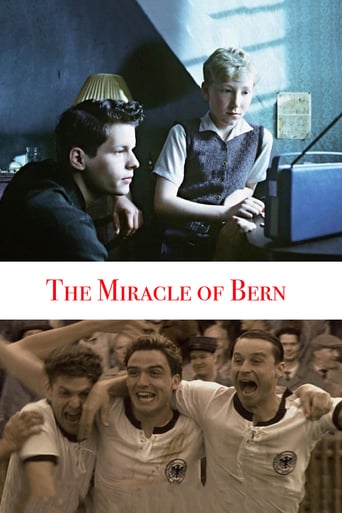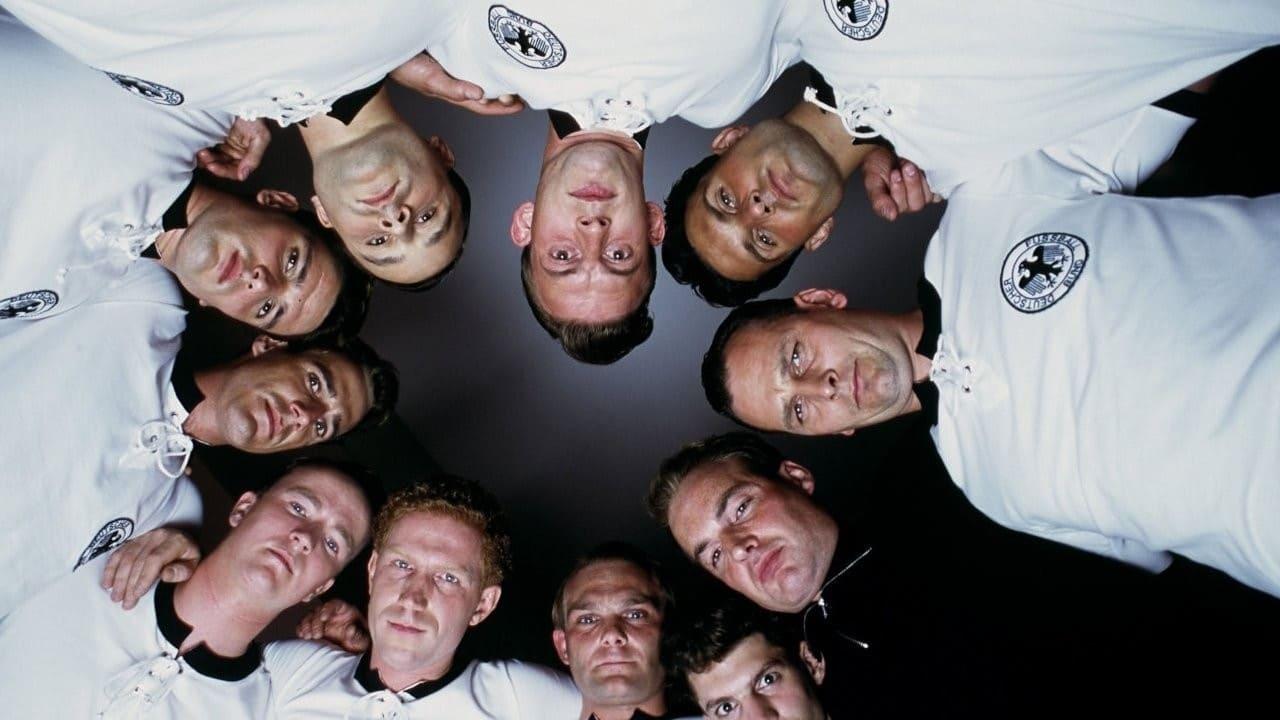Quadruplex
This could have been a nice movie about post-WW-II West Germany. Instead, it is just a pile of the cheapest, corniest movie clichés around.The story is preposterous. In short: little boy is the good luck charm of a German soccer player. The boy's father, jaundiced from doing time as POW in Russia, bullies the family after his homecoming. However, after just a chit-chat with the local priest, he opens up, the family members find together again, and grumpy dad turns into Mr. Nice overnight. So he borrows the priest's car and he and his son make it just in time to Switzerland to the final match of the 1954's world soccer championship. Naturally, the player spots the boy and wins the championship with the German team.As if this had not been kitsch enough, the sub-plots stink as well. You have the older son who is so rebellious that he joins the communist party in East Berlin - at a time when fugitives from East Germany flooded West Germany. You have the newspaper reporter who just happens to be at the hotel bar when members of the German team (who ignored the curfew) get drunk, the Swiss cleaning woman who lectures the German team's coach - and so on.The dialogs match the corny story - no father in the 1950's would have told his son "to find his style". Most lines are stiff and would have never been said at the time where the story is set.Speaking of sets: Yes, the Ruhr area was in rubble - but Wortmann makes it look like the village from "Monty Python and the holy grail". The newspaper's office looks more like Göring's Ministry of Aviation, the Bern "stadium" looks as fake as it is.In short: "The Bern Miracle" isn't miraculous at all.
Andres Salama
Historically, few movies have been made about football (or soccer, for those in the United States). I believe this is due for two reasons: 1) Hollywood wasn't familiar and care little for the sport for many years, and 2) European directors, who one would have expected to be more disposed to made such a film, have generally been dismissive of football. You see, in their mind, I think they see it as the opiate of the people (the working class in Western Europe would rather go and see a match on Sunday than start a revolution to overthrow capitalism). Only recently there have been a number of movies that deal with the world's most popular sport. This is in my opinion the best of them, dealing with the surprise victory of Germany in the 1954 World Cup over the highly favored team of Hungary. This victory was of historical significance for the Germans, according to some people, since it was the first victory of any kind Germany have 9 years after the end of the war, and it meant the start of a new era of increased self-confidence for the country. OK, maybe this is an exaggeration, but this movie, which mixes real characters (the players, coach Herberger) with invented ones (the journalist and his newly married wife, the kid from the Ruhr region who has a bad relationship with his former POW father and wants to go to Switzerland to see the final match) is thoroughly enjoyable from beginning to end.
mattijam
Das Wunder von Bern would be a great movie for men who think they still are boys, if it just wasn't as naive as it is.The movie is about a boy who in the middle of poverty finds inspiration in football - and a father he never had in a player of a local football team. Until his father actually returns from Russia, that is. Father is quite a serious character and almost every scene he's in has that dark tone to it. They have tried to lighten up the movie with a character of a sports journalist and his wife, but that's only confusing at best.As usually, they have tried to write a sports movie that would be more than a sports movie. The result is, it's hard to tell what the movie eventually is. Das Wunder von Bern is at it's best as a nostalgic journey back to the rugged sceneries and interiors of the 1950's.
basemnt-dwellr
I just watched "Das Wunder von Bern" and I must admit it is really a good film, not only for football fans (for you Americans: we Europeans say football for soccer). The film is not just a sports drama but deals more with the atmosphere in post war Germany and with the problems and aspirations the people had during that period and what the winning of the world championship by the German national football team meant for the regular people.Actually this atmosphere is covered excellently. The film shows that the people were still recovering from WW2. There are heaps of debris in the streets from houses destroyed during air raids and many men are still kept as POWs so that the women have to take care for the family. The children play football with a makeshift ball, and most people don't seem to have much money. Everything is shown in subdued colors which really contribute to this mood. Although the story is set in Essen, a city in the main industrial and mining region of Germany, it could have happened everywhere in Germany.
The colors only change during the scenes in Switzerland, where the world championship took place. In fact those scenes are shot in bright and friendly colors. And also the settings are quite different from those in Essen: whereas the location in Essen consists of small apartment buildings, narrow streets and those aforementioned subdued colors, everything in Switzerland seems to be posh and spacious.Even though the actors are not exactly great names in German cinema, they are quite good. As far as I know the actors who play the members of the German national football team were cast not only for their acting skills but also for their ability to play football. Thanks to that aspect the football scenes are quite convincing (although the spectators in the football stadium in Bern look really fake).What I really liked though was the fact that the filmmakers used the original radio commentary from reporter Herbert Zimmermann, which is legendary. Every German football fan knows the important parts of his commentary by heart.All in all a good and entertaining film, although I didn't really like the ending.


 AD
AD



